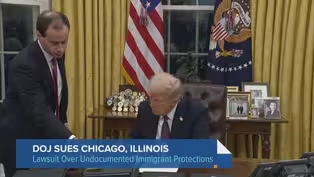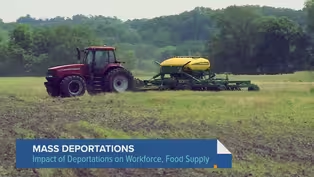Chicago Tonight: Latino Voices
A Look at the Potential Impact of Hiking Tariffs on Mexican Goods
Clip: 2/6/2025 | 8m 30sVideo has Closed Captions
President Donald Trump recently implemented a 30-day pause on 25% tariffs on Mexico and Canada.
Mexico is America's largest trading partner. It supplies most of the country's fresh produce and holds a strong monopoly on the automotive manufacturing sector.
Problems playing video? | Closed Captioning Feedback
Problems playing video? | Closed Captioning Feedback
Chicago Tonight: Latino Voices is a local public television program presented by WTTW
Chicago Tonight: Latino Voices
A Look at the Potential Impact of Hiking Tariffs on Mexican Goods
Clip: 2/6/2025 | 8m 30sVideo has Closed Captions
Mexico is America's largest trading partner. It supplies most of the country's fresh produce and holds a strong monopoly on the automotive manufacturing sector.
Problems playing video? | Closed Captioning Feedback
How to Watch Chicago Tonight: Latino Voices
Chicago Tonight: Latino Voices is available to stream on pbs.org and the free PBS App, available on iPhone, Apple TV, Android TV, Android smartphones, Amazon Fire TV, Amazon Fire Tablet, Roku, Samsung Smart TV, and Vizio.
Providing Support for PBS.org
Learn Moreabout PBS online sponsorship>> Fears are heightening over the potential of a new trade war in its possible impact across the country.
President Trump has agreed to a temporary pause on the 25% tariffs he's proposing on goods from Mexico and Canada.
The country's 2 largest trading partners.
The administration is promising to impose tariffs if the countries do not take address Trump's concerns over border security and drug trafficking.
Here to talk more about what it could mean locally are Juan Gonzalez, senior research fellow at Great Cities Institute at the University of Illinois, Chicago and I was on pain at as men of consul general of Mexico in Chicago.
Thank you both for joining us.
The Dane, I want to start with you.
Not of these tariffs are implemented.
What impact will that have on the relationship between make eagle in the U.S.?
>> I was certain that it will have a major impact.
Just think about this, Mexico, the U.S. and Canada one of the most important, free trade agreements in the world just pray that a Mexican, the U.S. amounts for a billion dollars annually.
Can you imagine that?
And the word war there is 2000 miles long.
you know, witness of all wonderful attend is in for the economy.
the end of the day, if some measure Davis passes sort most ahead is going to be impacting the supply chain between the 2 countries, but also the pockets of millions of consumers in this country.
And of course, in Mexico.
>> And one, let's continue to break down those impacts.
You know, what could this impact have on the labor workforce?
Well, France is Brookings Institution just come out recently with a report that says that if they're implemented at least 177,000 jobs in the U.S. will be lost, possibly up to 400,000 Mexico and and Canada Reese, we tally it with their own tariffs for Canada.
It could mean as much as half a million jobs lost and for Mexico over 2 million jobs lost.
And if that many people from Mexico lose your jobs, where do you think many of them will going to end up going to they're going to end up coming to the United States.
So what Mexico has actually been in in improving economically, more Mexicans have been staying in Mexico as a result of the social changes.
This could have drastic effect of countering all that and forcing more Mexicans to migrate to the United States an interest.
Interesting perspective that we haven't been hearing and in locally, how could tariffs affect people's wallets here?
>> Well, for Canada.
She caught the state of Illinois is the number one consumer of oil and gas from Canada.
47 billion dollars in oil and gas imports and if their tires slapped, that's going mean a sharp increase in what people in Illinois pay for their gas in Mexico.
The biggest import would port Haitian from Mexico in Illinois.
is beer and alcohol and beverages about over 5 billion dollars a year.
So a slapping a tariff on that is going to mean the people here are going to pay more for their alcohol for their beer and for their other beverages.
And of course, that's going unduly affect the poor sectors of the Illinois community would just say for fresh produce as well because we know condos, right, fresh produce, of condos, especially about the largest segment of importation from Illinois.
Mexican goods is a They now want to bring you in.
Mexico said.
>> It will respond with tariffs of its own without detailing what specific products can you give us an idea of what products could be affected?
>> I think will win distress right now.
Is that agreement that was reached recently, can that the government's and that currently, both governments were able to set this boss in this measure that was about to come in for us is a very positive.
That's a very positive development.
But it's important right now is that the country start talking on how to move ahead.
And as president of Mexico now, this said, let's make this pass permanent because all that is is is what one just mentioned.
You know, just to give you an example, pretty sure that the view that strawberries for breakfast this morning or some sort of very that's coming from Mexico you know, is that the avocados on the end of the year and all those things, the agriculture sector you know, of course, sells a lot to Mexico soybean it another props.
So I think it's very important that we keep that in mind and that we make sure that this pass this permanent.
And I know you talked about the 2 countries being a positive that they're speaking.
>> You know, and mentioning that, what do you think discussions should be focused on in those conversations?
I have to and no, because the president of Mexico now sit in the it's been it's been out in the >> That we have specific groups to discuss.
Of course, great.
That is very important.
But also what's going on a big you know, we're farther.
We want to make sure that there is a cure for both countries.
nobody favors drug trafficking.
that's also something that was put on the table by President Trump, but is very important that we discuss what's happening first temple, the illegal trade, fired guns into Mexico and some of the things that were of concern for the Mexican for the Mexican people, sir, we're really happy all those on the table, though.
We are thinking in a very calm way to move ahead to try to figure out how to make this permanent.
>> You know what it?
What are your thoughts?
You know, what do you think both countries are prioritized?
Well, I think the whole issue of drugs that that all the President Trump has race is really a red herring.
The United States has had addiction to elicit drugs for over a century.
You start with the 18 90's cracking down on opium of the opium trade in the 1960's on marijuana and LSD.
In the 1970's on heroin.
In the 1980's and 90's cocaine and crack and then on meth amphetamines.
And now we're dealing with fentanyl.
>> clearly, United States has an addiction problem.
There are many people in this country who mental problems and depression and anxiety and they treated with drugs rather than blame someone from the outside.
Want to we start looking at the hemp mental health needs of our own people and trying to figure out what our society is doing wrong.
That causes so many people to be drug-addicted has nothing to do with trade has nothing to do with other countries has to do with the internal problems of our own country.
>> And, you know, Trump's response, I want to bring counted into Trump's response to Canada's trade surplus was we don't need anything they have.
We have a limited energy.
We should make our own cars have Earl number than we could ever use.
How sustainable is it for America to rely solely on domestic manufacturing and sales of products?
Typically source from other countries sit well.
The reality is that much of the manufacturing that occurs in Mexico and China even in Canada is American companies.
General Motors last year produced 887,000 cars in Mexico for over 300,000 stellantis over 400,000.
These American companies go to these other countries because they want to pay less in labor costs.
So it's really American companies that benefiting from the situation rather than playing.
But it's the Mexicans eating our lunch or the Chinese that are destroying the United States.
Look at what your own companies power companies are doing in these countries.
And then a last question, how or financial markets, businesses and consumers trying to prepare for the possibility of new tariffs.
He would say.
Well, there is a very strong team in Mexico working on this.
And of course, they have to bear.
>> As as as it was labeled Plan B and plan C if necessary, just waiting for kind of decisions we're going to be taking this, the U.S. government.
But the end of the day, I cannot stress enough the importance.
Now there is an open dialogue that they're open negotiations and that we need to keep in mind.
All that stake.
When we talk about trade and we talk about the bilateral relationship, we share a very long border there.
So there is no other way than cooperation to make sure that this partnership
DOJ Sues Illinois, Chicago Over Protections for Undocumented Immigrants
Video has Closed Captions
Clip: 2/6/2025 | 3m 37s | Chicago’s Welcoming City ordinance is designed to ensure all residents can obtain city services. (3m 37s)
How Mass Deportations Could Affect Illinois' Farming Industry
Video has Closed Captions
Clip: 2/6/2025 | 6m 46s | The U.S. Department of Agriculture estimates that 42% of farm workers are undocumented immigrants. (6m 46s)
Providing Support for PBS.org
Learn Moreabout PBS online sponsorship
- News and Public Affairs

Top journalists deliver compelling original analysis of the hour's headlines.

- News and Public Affairs

FRONTLINE is investigative journalism that questions, explains and changes our world.












Support for PBS provided by:
Chicago Tonight: Latino Voices is a local public television program presented by WTTW

